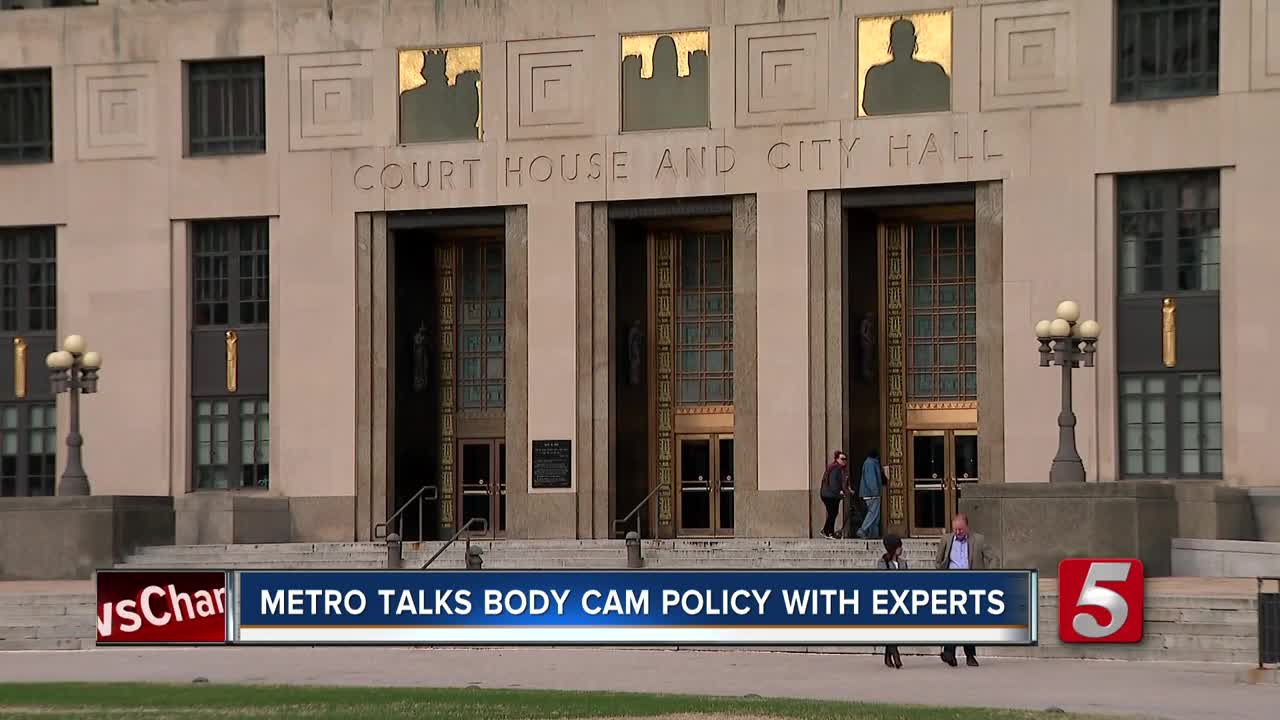NASHVILLE, Tenn. (WTVF) — Mayor John Cooper's office said it is optimistic about implementing police body-worn cameras after meeting with a group of experts from around the country.
The experts, who came from cities such as San Diego, Los Angeles and Las Vegas, sat down with several departments including Metro police, the public defender's office and the district attorney's office for nearly two days to discuss policy and address concerns.
The mayor announced that the city will deploy body-worn cameras in two phases this year. The DUI and Traffic Enforcement Units will first receive approximately two dozen in March, followed by additional cameras in May.
John Buntin, the mayor's policy director, seemed confident that the plan will be cost-effective and evidence-based, despite District Attorney Glenn Funk's concerns about resources and his report in December that estimated cameras would cost the city $36 million per year. The DA's office would need to hire 248 people, according to consultants hired by Funk last year.
However, Buntin said the experts thought the price estimate was very high nor did not believe it would take a large staff to operate the program.
"They're based on what it would cost to review and redact all video. That is not an approach that other jurisdictions have taken," Buntin said in a press conference. "We want to use video where it's necessary and where it is legally appropriate."
The DA's office talked about protecting sensitive information and making sure video shared does not get disseminated.
The majority of the visit with police analyzed ways to protect privacy, when to activate and deactivate the body cameras, how they were going to audit and how to make sure officers are in accordance with the policy. Buntin did not give specifics but mentioned how they spent hours working through pages of the policy's draft. He used the Los Angeles Police Department as a possible example of using cameras when there is enforcement or investigative action.
"There was a universal sense of being as clear as possible about when those cameras turn on is a critical part of any policy," Buntin said.
In her meeting, Martesha Johnson, Davidson County's chief public defender, emphasized how important it is for public defenders to have easy and quick access to body-worn camera evidence that is relevant to the case.
The Community Oversight Board director also met with the experts and discussed keeping an open communication.
The experts will return at the end of the month for a public meeting. There are plans to have a public event at a later date to showcase the technology and ways it would protect privacy, discuss safeguards that would prevent evidence being tampered with and share policy drafts.
The city's update comes on the same day State Rep. John Ray Clemmons (D-Nashville) announced his plans to introduce a bill that would mandate "the full implementation of body-worn cameras and patrol cameras in Nashville by February 10, 2021."
Clemmons cited a report by Vanderbilt University on how 93% of Nashvillians supported the use of body cameras. While he did not give a number on funding, Clemmons said he is going to propose tax-related bills that could provide more funding to local government. In his opinion, some of the figures surrounding the body camera program were legitimate or "exorbitant and greatly exaggerated."
"Nashville is not collecting all and benefiting from our economic growth to the extent it should. Some of this pain Nashville is feeling is self-inflicted but we need some leadership at the state and local level to get this funded," Clemmons said.
A Metro police spokesperson responded to Clemmons' announcement by saying that the department is moving forward with the program.
The mayor's press secretary released a statement saying, "Mayor Cooper announced a plan in December to begin deploying and testing body-worn cameras beginning in March. We welcome the opportunity to meet with Rep. Clemmons or other state officials who may have questions about our deployment roadmap."


